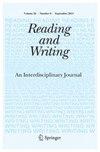Recursivity in source-based writing: a process analysis
IF 2.2
2区 教育学
Q2 EDUCATION & EDUCATIONAL RESEARCH
引用次数: 0
Abstract
Abstract In university settings, writing argumentative essays from reading conflicting source texts is a common task for students. In performing this synthesis task, they must deal with conflicting claims about a controversial issue as they develop their own positions. Argumentative synthesis is characterized by writers’ back-and-forth moves between reading source texts and writing their own texts—a self-regulatory process that can be termed recursivity. The present study investigated the recursive behavior of Italian university students as they wrote argumentative syntheses while reading conflicting sources. The 43 graduate students participating in the study read four source texts on a controversial topic, evaluation in academe, with the goal of writing an argumentative essay. Reading of the sources was studied through a think-aloud procedure, and recursivity in writing the syntheses was recorded through Inputlog software. Comparisons were made between 22 high-recursive and 22 low recursive writers for the quality of their argumentative essays and for the critical strategies that they had used in reading the sources. Descriptive and nonparametic analyses produced the following three findings: (1) The strategies most employed in prereading were all related to synthesis-related activities: voicing opinion, expressing agreement, and expressing doubts. (2) Recursivity occurred most often in the middle of the synthesis process, as writers developed their arguments, instead of at the beginning or end. (3) High-recursive writers surpassed low-recursive writers by producing argumentative essays of higher quality and obtained better recall scores. They also employed more critical processing relevant to synthesis when reading the sources. This study provides insight on how recursivity is involved in argumentative writing but still there is need for further research.

基于源的写作中的递归性:过程分析
在大学环境中,通过阅读相互矛盾的源文本来撰写议论文是学生的一项常见任务。在执行这一综合任务时,他们在形成自己的立场时,必须处理关于一个有争议问题的相互矛盾的主张。议论文综合的特点是作者在阅读原文和写自己的文章之间来回移动——这是一个自我调节的过程,可以称为递归。本研究调查了意大利大学生的递归行为,因为他们在阅读相互矛盾的资料时写了议论文。参与这项研究的43名研究生阅读了四篇关于一个有争议的话题“学术评估”的原始文本,目的是写一篇议论文。通过一种有声思考的程序来研究来源的阅读,并通过Inputlog软件记录撰写合成的递归性。比较了22位高递归和22位低递归作家的议论文质量和他们在阅读资料时使用的批评策略。描述性和非参数分析得出以下三个发现:(1)预读中最常用的策略都与综合相关的活动有关:表达意见、表达同意和表达怀疑。(2)递归最常发生在综合过程的中间,当作者发展他们的论点时,而不是在开始或结束时。(3)高递归写作者比低递归写作者写出了更高质量的议论文,获得了更好的回忆分数。在阅读资料时,他们还采用了与综合相关的更关键的处理方法。这项研究提供了递归是如何参与议论文写作的见解,但仍有进一步的研究需要。
本文章由计算机程序翻译,如有差异,请以英文原文为准。
求助全文
约1分钟内获得全文
求助全文
来源期刊

Reading and Writing
Multiple-
CiteScore
5.20
自引率
16.00%
发文量
0
期刊介绍:
Reading and writing skills are fundamental to literacy. Consequently, the processes involved in reading and writing and the failure to acquire these skills, as well as the loss of once well-developed reading and writing abilities have been the targets of intense research activity involving professionals from a variety of disciplines, such as neuropsychology, cognitive psychology, psycholinguistics and education. The findings that have emanated from this research are most often written up in a lingua that is specific to the particular discipline involved, and are published in specialized journals. This generally leaves the expert in one area almost totally unaware of what may be taking place in any area other than their own. Reading and Writing cuts through this fog of jargon, breaking down the artificial boundaries between disciplines. The journal focuses on the interaction among various fields, such as linguistics, information processing, neuropsychology, cognitive psychology, speech and hearing science and education. Reading and Writing publishes high-quality, scientific articles pertaining to the processes, acquisition, and loss of reading and writing skills. The journal fully represents the necessarily interdisciplinary nature of research in the field, focusing on the interaction among various disciplines, such as linguistics, information processing, neuropsychology, cognitive psychology, speech and hearing science and education. Coverage in Reading and Writing includes models of reading, writing and spelling at all age levels; orthography and its relation to reading and writing; computer literacy; cross-cultural studies; and developmental and acquired disorders of reading and writing. It publishes research articles, critical reviews, theoretical papers, and case studies. Reading and Writing is one of the most highly cited journals in Education, Educational Research, and Educational Psychology.
 求助内容:
求助内容: 应助结果提醒方式:
应助结果提醒方式:


